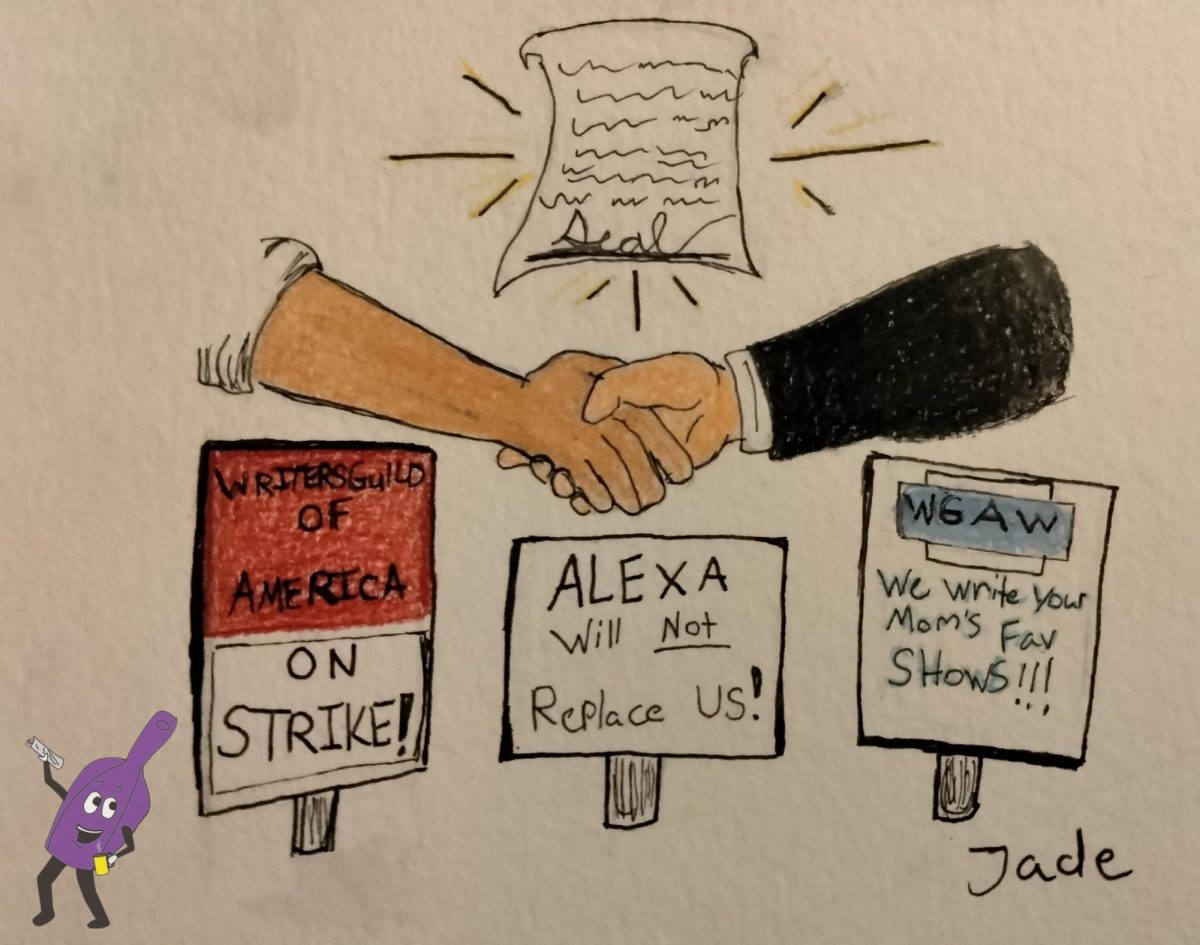With the rapid development of AI (artificial intelligence) in recent years, the entertainment industry has seen major change. AI use in art has become a topic of discussion, and many fear the implications this new avenue holds. Writers and actors specifically are heavily impacted by this new and ever-developing technology.
Labor abuse can be seen in all sectors, and entertainment is no exception. Along with technological threats, this pairing has led to a historical strike of both Hollywood writers and actors. The writers have struck a deal after an arduous strike and negotiation process. Despite this, the future of the industry is yet to be seen.
The Writers Guild of America (WGA) is the primary union for American screenwriters. Beginning May 2, 2023, they began a strike that stretched 148 days. Major complaints stated by the WGA include underpayment for writers, as well as the use of AI.
These grievances are held against the AMPTP (Alliance of Motion Picture and Television Producers). The AMPTP represents major companies including Disney, Warner Bros, Discovery, Apple, Amazon, Paramount, Sony, Netflix, CBS, and NBC Universal.
Many of these companies including Disney have a history of alleged exploitative practices. This shows a pattern leading to the 2023 strike.
Much of the issue of underpayment can be attributed to the payment system used. Writers are paid by residuals. Residuals are a small portion of the revenue from sources such as running the show on TV and streaming services.
Streaming residuals differ from other forms. They are paid at a flat rate, depending on the number of subscribers to the service, rather than the number of streams. This has led to residuals becoming a significantly lower ratio of studio revenue, as most revenue for AMPTP companies is now sourced from streaming services.
Additionally, AI use has become a problem for Hollywood writers. The use of AI to lessen the amount of human labor has become a new possibility. The lowered value of their work puts writers at risk.
Throughout the strike, abuses continued. The WGA and SAG-AFTRA, the leading actors guild, complained of dangerous conditions created by NBC. This includes forcing the unions to picket in unsafe streets with no traffic barrier provided. They have been accused of breaking labor laws, and blocking the constitutional rights of picketers.
On July 14, 2023, SAG-AFTRA followed suit declaring an official strike. Union president Fran Dresser upon the beginning of the strike spoke out about the conditions of actors, saying “No, we’re not going to take this anymore.”
This September proved monumental for the rights of writers. The WGA struck a deal with the AMPTP outlining the negotiations for companies. This includes a minimum pay increase guideline, as well as increased health benefits and pension.
This deal also outlined regulations on AI use. The writing of literary material by AI, and the training of AI using writers’ material is prohibited. Use of AI on projects must be disclosed to writers, and they must not require a writer to use AI. This creates a standard of consent and transparency.
Despite the writers’ successful negotiations, the industry has yet to get back on its feet. SAG-AFTRA is still on strike, awaiting a final deal. Actors’ grievances are similar to that of the WGA when it comes to underpayment.
Where AI use comes to harm actors is in “synthetic performers”. This means that companies can create digital replicas of an actor’s likeness. This idea is incredibly frightening to actors. Many film companies are looking to hire only those willing to sign over their likeness to the company. This would reduce work for actors astronomically, leaving many struggling to get by.
This has even expanded to the video game industry. SAG-AFTRA granted a strike for video game voice actors. AI once again poses a threat to the jobs of voice actors. Replications of any character voice can be created with programming.
For SAG-AFTRA’s actors, many have a positive outlook for the coming week. Media experts cite the WGA deal as a sign of an agreement for SAG-AFTRA, considering the protections granted to writers. Lisa Takeuchi Cullen, a writers guild member, spoke at a SAG-AFTRA rally, saying, “We didn’t get everything, and you guys won’t either. But I think you’re gonna get most of it.”
On the contrary, other professionals are doubtful of a speedy conclusion. A picketing SAG-AFTRA member expresses the viewpoint that “No one is going into this overly confident or assuming it’s going to be easier because the writers have made their deal.” Many point out the difference in demands, especially considering the higher weight of AI use on actors.
Monday, October 2, 2023, negotiations between SAG-AFTRA and the AMPTP resumed. The discussions were halted on July 12, with high tensions between studio heads and guild members. The new stream of negotiations will continue. Following that Monday the next meeting is scheduled for Wednesday, October 4.
The impact of the production halt has created a dent in the US economy. According to Milken Institute economist Kevin Klowden, a prediction of $5 billion will be lost in the States.
When it comes to the return of popular shows and the comeback of Hollywood, much is in the air. The WGA deal holds optimism as writers are slowly reentering the workforce, however, major studio productions cannot resume until a contract is made with SAG-AFTRA.
Many writers vow to stay on the picket lines until negotiations are met for actors as well. Solidarity between the close-working guilds is strong as actors and writers alike wait for the future of their careers.
Wins on the side of labor unions are being celebrated, however, the Hollywood strikes are not over. Hollywood films remain on hold, so now is a time to stick with reruns or delve into the world of indie movies.





